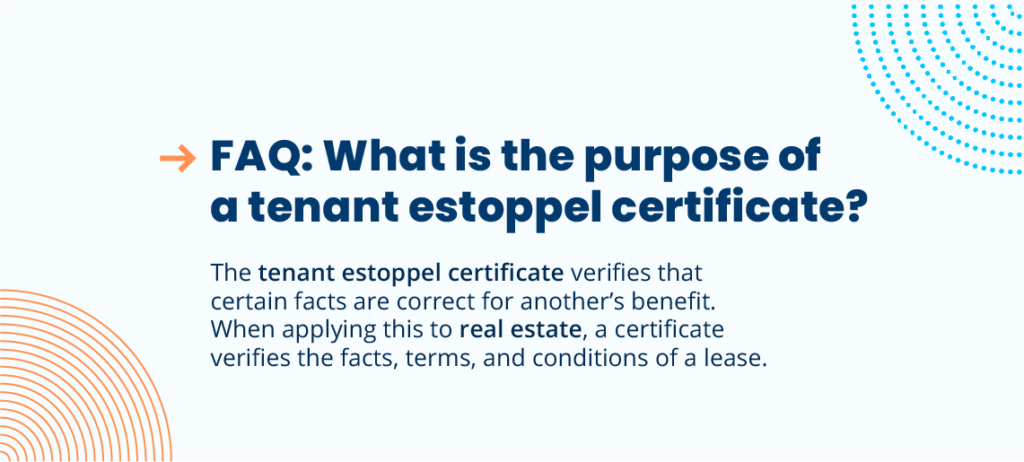In this article, you’ll find…
Finding the perfect tenant for a brand new investment property is a top priority for landlords, so what could be better than purchasing a home that already has tenants?
As great as an immediate cash flow seems, buying a tenant-occupied property does come with a learning curve. That curve includes understanding the use and importance of a tenant estoppel certificate.
In this article, you’ll discover the ins and outs of inheriting tenants as a landlord, why estoppel certificates are an important part of this process, and how to ensure a successful relationship with your new tenants.
What is a Tenant Estoppel Certificate?
An estoppel certificate is a “Written, signed stipulation of previously established facts preventing subsequent contradiction or recant of these facts.”
When applying this to real estate, a tenant estoppel certificate verifies the terms, conditions, current status of a lease agreement, and crucial for the investor, proof of cash flow. Essentially, it summarizes the most important clauses within a lease, providing a factual representation at the time of signing.
Inheriting Tenants: The Good & The Not Great
It sounds too good to be true; buying an investment property with tenants already inhabiting it. For a landlord, this means an immediate cash flow, plus zero worry about tenant screening and marketing the property. You might get lucky and inherit great long-term tenants who keep your rental vacancy filled for years to come.
Or, you may not. Poor tenants (think: property damage, lease agreement violations, and late-rent payments) are always a possibility when you haven’t screened the tenant yourself. The previous landlord might have used weak screening criteria and accepted the first renter who applied to the rental application. To make matters worse, they may purposely fail to disclose the tenants’ bad behavior to ensure a successful sale of the property, leaving you with the difficult decision to keep or evict the tenants.
Besides poor tenants, there might be additional barriers. While you could inherit excellent tenants, they may not be ready to inherit a new landlord. The tenants could be comfortable and accustomed to the way their current landlord operates; not regularly raising the price of rent or performing rental inspections. Depending on the changes you make as the new landlord, the tenants may be shell-shocked and end the lease early.
Stuck with poor tenants or tenants that don’t like you? Managing these situations can be tricky, but they don’t have to be. Here are several clear options you have as a landlord:
- Cash for keys – A cash-for-keys agreement is exactly what it sounds like – you offer a sum of cash for your current tenant to vacate the property.
- Eviction – Follow this 5-step guide to learn how to legally and successfully evict tenants.
- Month-to-Month Lease Agreements – When it comes time to renew the lease, opt to update it to a month-to-month lease agreement so you can end it whenever you need. Or simply, don’t renew the lease.
How Estoppel Certificates Protect Buyers & Tenants
One of the most important things a tenant estoppel certificate does is serve as a surety measure. By establishing an agreement on the current lease, the certificate ensures that no party – the buyer or the tenants – can contradict the information at a later date. Because of this, it protects both parties equally.
For buyers, this prevents tenants from attempting to pay lower rent since the tenant cannot recant or back out of the real rent price or other lease agreement terms. The estoppel certificate also helps the buyer ensure that the current tenants don’t have any claims, financial or legal, against the current landlord. For example, if maintenance is required in the unit, renters could withhold future rent payments. In the case that the tenant does have such a claim against the landlord, it would transfer over to the buyer if they were not dealt with before the sale of the property.
An estoppel certificate enables tenants to affirm or deny information the landlord is presenting to the buyer. This protects tenants from inaccurate lease information like a changed end date of the lease or an increase in rent payments. It also ensures the buyer knows about any maintenance promises the current landlord has made, thus the broken dishwasher must be repaired.
Tenants should ensure all agreements with landlords are included in the estoppel certificate so they are upheld by the new landlord.
How to Have a Successful Relationship with Inherited Tenants
The transfer of rental ownership from one landlord to another can be very stressful for tenants. They may be wondering how your landlording style differs from their original landlord, and simply, if you will get along. These concerns are valid, which is why starting on the right foot is key to having a successful relationship with your new tenants. Here are five steps on how to do just that:
- Send a welcome letter – Make the transition from the old landlord to you as smooth as possible. Introduce yourself in the letter and include pertinent information, like initial payments, utility set up, and contact information. Think of this letter as the foundation of a successful relationship with your new tenant. Let’s make the foundation strong!
- Provide a tenant welcome package – A package is an excellent addition to the welcome letter. You might include helpful cleaning supplies, a gift card to a local pizza place, and a list of emergency contacts. This will help set the right tone by showing the tenant you are invested in their well-being.
- Live up to the old landlord’s and your promises – If you say you are going to do something or the old landlord said they were going to do something, then do it. Fix that dishwasher and paint the exterior of the home. By treating your tenants well, they tend to return the favor.
- Be compassionate – Listen to your renters and understand things happen sometimes that require understanding from you, the landlord. Whether that thing is late rent or failure to report a maintenance issue, the tenant may be experiencing something that requires your empathy and understanding.
- Develop effective communication – Maintaining an open dialogue is paramount to building and keeping a successful landlord-tenant relationship. This will help you keep up with the property’s condition while also making sure your tenants know they can come to you with any questions or issues. To make communication easy for yourself and your tenants, utilize comprehensive messaging tools like TurboTenant’s.
Whether you’re the landlord, tenant, or buyer, it’s important for you to have a thorough understanding of the information included on a tenant estoppel certificate. Ultimately, it is there to protect all parties from the fallout of inaccurate information.
New landlords, when the time comes for your inherited tenants to move on, you will need to switch your focus to filling your vacancy. Prepare ahead of time by finding the tools you will need right in your TurboTenant account. Get started today with marketing your property online, accepting online rental applications, and screening tenants.
Tenant Estoppel Certificate FAQs
What is the purpose of a tenant estoppel certificate?
The tenant estoppel certificate verifies that certain facts are correct for another’s benefit. When applying this to real estate, a certificate verifies the facts, terms, and conditions of a lease agreement are correct at the time of signing.
Where can I get a tenant estoppel certificate?
A tenant estoppel certificate is included in our Landlord Forms Pack.
Who requests a tenant estoppel certificate?
Generally, the buyer or lender will request a tenant estoppel certificate as proof of cash flow and to determine potential exposures they may face as soon-to-be owners of the property.
Will the security deposit be transferred from the old landlord to the new landlord?
Yes, the security deposit will be transferred to the new landlord at the time of sale.
Disclaimer: TurboTenant, Inc does not provide legal advice. This material has been prepared for informational purposes only. All users are advised to check all applicable local, state, and federal laws, and consult legal counsel should questions arise.



